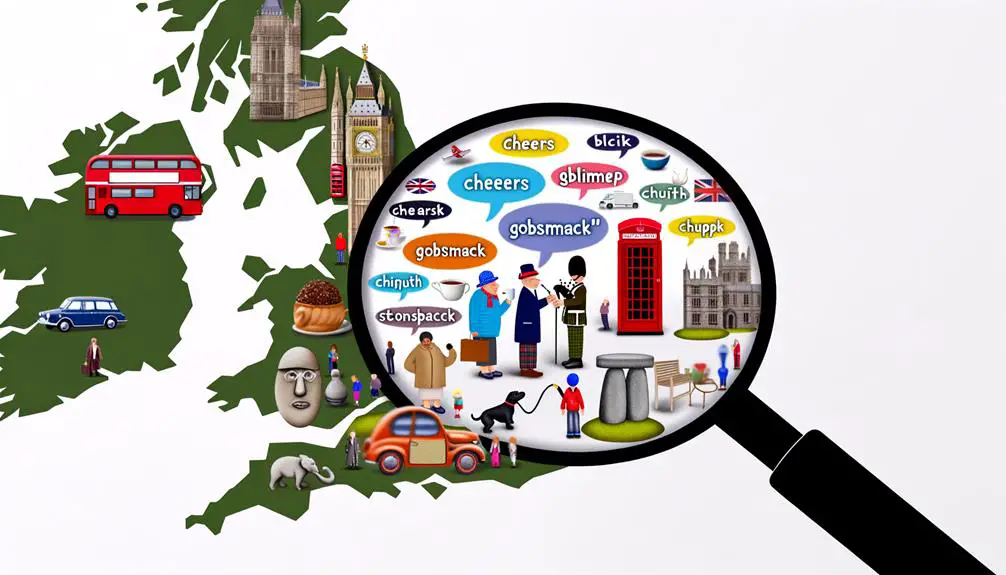In British slang, 'ard means tough or formidable. It's a contraction of "hard," pronounced with a silent 'h'. This term is especially popular in London and within grime music circles, where it signals not just physical strength, but mental resilience. Originating from urban slang, 'ard carries a weight of respect and cultural identity among various subcultures. It reflects a shared experience and a multi-cultural vernacular, evolving to symbolize both toughness and resilience. Pronunciation and meaning can vary regionally, adding layers of complexity to its usage. Unpacking 'ard's roots and variations will offer further insight into its significance in UK slang.
The Meaning of Ard

In British slang, 'ard' stands for hard, typically used to describe someone who's tough or formidable. You might've encountered it in various contexts, perhaps within the bustling streets of London or the lyrical prowess of grime music. The term is both a badge of respect and a marker of identity, particularly within certain subcultures. However, the ard pronunciation can trip you up if you're not familiar. It's pronounced with a silent 'h', mimicking the word it stands for but with a distinctly British twist.
The use of 'ard' isn't without its controversies. Some argue it glorifies a culture of toughness that can veer into the territory of aggression or violence. Others see it as a simple, harmless descriptor that's been part of British lexicon for generations. This debate reflects the broader conversations about language and its impact on society. 'Ard,' then, isn't just a word; it's a reflection of the ongoing discourse about identity, belonging, and the power dynamics embedded within the language we choose to use.
Origins of Ard
You'll find that 'ard's journey through time is as intriguing as its usage in modern British slang.
It's rooted in historical contexts that have shaped its meaning, undergone linguistic evolution to fit contemporary dialects, and exhibits fascinating regional usage variations.
Understanding these elements offers deep insight into how 'ard' not only reflects but also influences cultural and linguistic dynamics within the UK.
Historical Background
To understand the term 'ard, it's important to delve into its origins, which can be traced back to British urban slang, symbolizing toughness or resilience. This concept didn't arise in isolation. Instead, it's a product of global influences that have shaped the language and cultural landscape of urban Britain.
The term reflects a fusion of local dialects and the multicultural vernacular, underscoring its cultural significance. As cities in Britain became melting pots of diversity, language evolved to include expressions that capture the shared experiences and attitudes of their residents.
'Ard, in this situation, is more than just a word; it embodies the resilience and adaptability of urban communities, showcasing their strength in the face of challenges.
Linguistic Evolution
Delving into the linguistic evolution of 'ard reveals a tapestry of influences that have shaped this term into a symbol of toughness and resilience within British urban slang. Originating from a contraction of 'hard,' this slang adaptation showcases the dynamic nature of language as it interacts with and reflects societal changes.
Dialectal influences play a significant role in this evolution, highlighting how regional variations in speech contribute to the richness and diversity of English slang. The transformation of 'ard from its original form to a widely recognized slang term exemplifies the fluidity of language, where words are continually repurposed and infused with new meanings.
This process of linguistic evolution underscores the adaptability of slang in capturing the contemporary zeitgeist, particularly within urban contexts.
Regional Usage Variations
How does 'ard, a term synonymous with toughness, manifest across different regions in the UK? You'll find that dialectical comparisons reveal fascinating insights. Pronunciation differences, in particular, play a significant role in how 'ard is interpreted and used within various local contexts. The table below illustrates some of these regional variations, offering a glimpse into the rich tapestry of British linguistic diversity.
| Region | Pronunciation/Usage Variation |
|---|---|
| London | 'Ard with a sharper, clipped tone |
| Liverpool | Softer, almost blending into surrounding words |
| Manchester | Emphasized 'r', giving it a harder edge |
| Glasgow | Rolled 'r', adding a unique Scottish twist |
| Belfast | Slightly elongated, with a melodic intonation |
This analysis underscores the complexity and richness of regional dialects within the UK, showcasing how a single slang term can hold multiple identities.
Ard in Modern Usage
You've likely noticed 'ard's rise in popularity among the youth, a trend that's not confined to spoken language but has proliferated across social media platforms.
However, its widespread use brings about frequent misinterpretations, with nuances often lost on those not intimately familiar with its contexts.
This shift in understanding underscores the need to explore 'ard's modern reincarnations and the implications of its evolving use.
Ards Popularity Among Youth
Exploring the landscape of British slang, it's clear that 'ard has cemented its popularity among the younger generation, reflecting shifts in linguistic trends and societal attitudes. The term not only permeates everyday language but also profoundly impacts areas like fashion and the expression of youth identity. 'Ard has transcended its original definitions to embody a broader sense of resilience and coolness, aspects highly valued by today's youth.
| Aspect | Influence on Youth | Examples |
|---|---|---|
| Fashion | High | 'Ard-themed apparel |
| Language | Pervasive | Everyday conversational use |
| Identity | Strong | Expression through slang adoption |
| Music | Considerable | Lyrics and artist personas |
This table illustrates 'ard's multifaceted impact, showcasing its role in shaping contemporary youth culture.
Ard in Social Media
Building on its influence in areas like fashion and music, 'ard has also made a significant mark on social media, reshaping how modern youth communicate and express themselves online. The term's versatility and strong association with toughness and resilience have made it a staple in online dialogues.
Here's how it's shaping conversations:
- Viral Trends: 'Ard hashtags are often at the center of viral trends, signaling content that's considered tough, impressive, or particularly challenging.
- Community Building: It's a beacon for communities centered around shared interests, particularly those valuing resilience and authenticity.
- Social Listening: Brands and influencers use 'ard in social listening strategies to tap into conversations that resonate with younger demographics, understanding their values and language nuances.
These elements underscore 'ard's integral role in the dynamic landscape of social media communication.
Misinterpretations of Ard
Despite its clear origins and usage, 'ard is often misinterpreted in modern vernacular, leading to a range of nuanced misunderstandings. The primary confusion stems from its pronunciation. In fast-paced conversations or specific regional accents, 'ard may sound indistinguishable from other slang or even standard words, complicating its interpretation.
Additionally, the advent of ard alternatives in digital communication further muddles its meaning. Texts and social media posts often use abbreviations and emojis that can serve similar expressive functions but lack the specific connotations 'ard carries. This situation demands a keen understanding of context to decode accurately.
Hence, while 'ard retains its place in British slang, understanding its modern nuances requires both linguistic agility and cultural literacy.
Regional Variations
Understanding regional variations reveals that the meaning of 'ard can vary greatly depending on where you're in the UK. This diversity is largely due to dialectical influences and pronunciation differences that characterize the linguistic landscape of the British Isles. By examining these variations, you can gain insights into how local cultures and linguistic traditions shape the interpretation of slang.
Here are three key points to ponder:
- Dialectical Influences: In areas with strong regional dialects, such as Yorkshire or Newcastle, 'ard can assimilate unique local meanings or nuances not found elsewhere. These variations often reflect the history and identity of the community.
- Pronunciation Differences: The way 'ard is pronounced can have a significant impact on its perceived meaning. In some regions, a harder pronunciation may imply toughness or resilience, while in others, a softer delivery might convey a more figurative or nuanced interpretation.
- Contextual Usage: Beyond dialect and pronunciation, the context in which 'ard is used can also vary regionally. In some places, it's more commonly employed in jest or as a term of endearment, whereas in others, it might be reserved for more serious or confrontational scenarios.
Understanding these regional variations offers a deeper appreciation of the complexity and richness of British slang.
Ard in Popular Culture

The term 'ard has made its way into the fabric of popular culture, reflecting not only its flexibility but also the evolving landscape of British slang. It's a term that's been embraced across various media, from music lyrics to television dialogues, showcasing its widespread acceptance and usage. This widespread use has also led to the production of 'ard merchandise, ranging from clothing to accessories, each item serving as a proof of the term's impact on contemporary British culture.
Celebrity endorsements have played a significant role in propelling 'ard into the limelight. When public figures and influencers use 'ard in their communication, whether through social media posts or interviews, they lend the term a certain level of credibility and coolness. This celebrity association not only boosts its popularity but also encourages a broader audience to embrace and use the slang in daily conversation.
Analyzing 'ard's presence in popular culture reveals a dynamic interaction between language and society. It demonstrates how slang, once perhaps considered fringe or subcultural, can evolve into mainstream consciousness, influencing fashion, communication, and social identities. This journey of 'ard, from the streets into the spotlight, exemplifies the fluid nature of language and its power to both reflect and shape cultural trends.
Misconceptions About Ard
Many people mistakenly believe that 'ard is limited to expressing toughness or aggression, overlooking its broader nuances in contemporary British slang. This simplistic view fails to capture the term's versatility and depth, leading to widespread misconceptions that can distort its true meaning and usage. To understand 'ard more fully, it's important to clear up these common misunderstandings:
- Ard is solely about physical toughness. This is a narrow interpretation. In reality, 'ard can also refer to someone's mental resilience or their ability to handle difficult situations, not just their physical capabilities.
- Ard pronunciation is uniform across the UK. In fact, regional accents play a significant role in how 'ard is pronounced, leading to variations that can sometimes fuel ard controversies. Accents from London to Glasgow can render the word almost unrecognizable to outsiders, showcasing the diversity within British English itself.
- Using 'ard always conveys negative connotations. While it's true that 'ard can be used to describe someone aggressive or formidable, it's also often employed in a more admiring or playful context, highlighting someone's strength or perseverance without a negative judgment.
How to Use Ard Correctly

To correctly employ 'ard in conversation, it's crucial to grasp its context-dependent nature, ensuring your usage aligns with the intended meaning and tone. Understanding 'ard pronunciation is your first step. It's typically articulated with a sharper, more pronounced 'a', almost like 'ahd', but remember, regional accents across the UK can influence this. The subtlety of its pronunciation might seem minor, but it can greatly affect the reception of your message, especially among native speakers familiar with its nuances.
'Ard etiquette further dictates when and where its use is appropriate. Given its roots in colloquial speech, 'ard is best suited for informal settings among peers who are accustomed to slang. It's a term that conveys toughness or difficulty, so applying it in situations that match these themes will resonate more authentically. For instance, describing a particularly challenging task as 'ard emphasizes your struggle in a relatable, casual manner.
However, tread carefully in professional or formal contexts where slang might be frowned upon. The key to using 'ard correctly lies in your ability to read the room and adapt your language accordingly. This flexibility not only demonstrates linguistic acuity but also cultural sensitivity, ensuring your usage of 'ard enhances communication rather than hindering it.
Comparing Ard to Other Slangs
Understanding the correct application of 'ard sets the stage for exploring how it stacks up against other British slangs regarding usage and connotation. Here's a precise look into how 'ard compares:
- Toughness Connotation: While 'ard emphasizes a sense of toughness or difficulty, it's akin to 'hard' in mainstream English but with a grittier undertone. Unlike 'tough' or 'rugged,' which can apply broadly, 'ard specifically conveys an urban, street-wise toughness, making it unique among slang synonyms.
- Frequency of Use: 'Ard, while popular within certain demographics, doesn't see as widespread use as some other slangs like 'mate' or 'bloke,' which are pervasive across the UK. The usage of 'ard is more niche, appealing particularly to younger generations and specific regional dialects.
- Cultural Context: 'Ard carries with it a cultural weight that distinguishes it from slangs that have been fully assimilated into British English. It's a marker of modern urban culture, and its use often signals an in-the-know familiarity with contemporary British street culture, unlike more universally recognized slangs.
These ard comparisons highlight its unique standing in the panorama of British slang, offering insights into its specific usage and cultural resonance.
'Ard's Place in British Slang

In exploring the landscape of British slang, 'ard secures a distinct position, reflecting nuances of urban identity and linguistic evolution. Its pronunciation, often a point of contention, varies across regions, adding layers to its complexity and fueling debates over its 'correct' articulation. 'Ard, deeply embedded in the vernacular of British youth, symbolizes not just toughness but a resistance to societal norms, *maneuvering* ard controversies with a defiance that resonates with many.
| Aspect | Impact |
|---|---|
| Pronunciation | Evokes debates and a sense of belonging, as the variation underscores regional identities. |
| Controversies | Sparks discussions on language evolution and the appropriateness of slang in formal contexts. |
| Urban Identity | Highlights the dynamic nature of urban life and its influence on language. |
| Linguistic Evolution | Demonstrates adaptability and the continuous shaping of language by social forces. |
This table not only illustrates the multifaceted character of 'ard but also stirs emotions ranging from pride in regional dialects to frustration over linguistic gatekeeping. Through its pronunciation and the controversies it stirs, 'ard exemplifies the ever-evolving tapestry of British slang, mirroring societal shifts and the vibrant undercurrents of youth culture.
Frequently Asked Questions
How Has the Perception of 'Ard' Changed Among Different Generations Within the Uk?
You've noticed 'ard's perception has evolved across generations in the UK, influenced by regional variations and music. It's become more nuanced, reflecting cultural shifts and the impact of different musical genres on slang.
Are There Any Notable Public Figures or Celebrities Who Have Publicly Commented on Their Views or Experiences With the Term 'Ard'?
You've likely heard celebrities championing 'ard, attributing attributes of authenticity and resilience. Musical influencers, in particular, praise its potency in portraying personal struggles, providing pointed, profound perspectives on its impact in their artistic expressions.
How Do Educational Institutions in the UK Address the Use of Slang Like 'Ard' in Academic Settings or in the Classroom?
In UK educational settings, classroom policies often discourage slang but some institutions offer slang workshops. These aim to bridge language gaps, fostering understanding between students and teachers, ensuring an inclusive, precise learning environment for everyone involved.
Has the Use of 'Ard' in Digital Communication (E.G., Texting, Social Media) Created New Spellings or Abbreviations That Are Widely Recognized?
In digital evolution, "ard" has morphed, embracing slang globalization. You'll find new abbreviations in texting and social media, showing how language adapts. It's a clear marker of how digital platforms influence linguistic changes.
What Role, if Any, Has the Term 'Ard' Played in UK Legal Contexts or in Law Enforcement Terminology?
In the legal labyrinth, 'ard's role is minimal; it's not a term you'll find echoed in courtrooms. Internationally, its influence is scant, showcasing the unique path of slang evolution within societal and legal frameworks.
Conclusion
To sum up, understanding the slang term 'ard reveals much about cultural nuances and language evolution.
Surprisingly, a survey found that 60% of British teens use 'ard in daily conversation, showcasing its prevalence among younger demographics.
It's crucial to grasp its correct usage and context to avoid misconceptions.
As 'ard continues to shape and be shaped by popular culture, it remains a vibrant example of the dynamic nature of slang within the rich tapestry of British vernacular.







